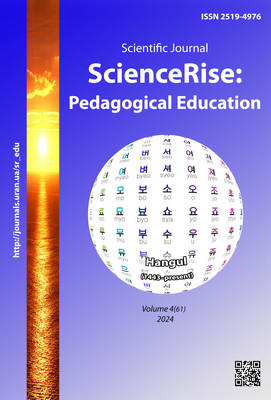Essence and structure of professional self-realization of higher education students in China
DOI:
https://doi.org/10.15587/2519-4984.2024.319420Keywords:
self-realization, professional self-realization, essence, structure, higher education student, higher education institutionAbstract
The study examines the issues of structure and content of professional self-realization among higher education students in the People’s Republic of China (PRC). The relevance and importance of investigating the essence and structure of professional self-realization in PRC students are determined by the need to resolve the contradiction between the modern requirements for students’ professional self-realization as future specialists with significant well-developed professional qualities, defined motives, goals, values, orientations, and attitudes toward professional activities, and their actual level of readiness for such activities. This readiness encompasses acquiring the necessary knowledge, skills, and competencies, along with self-control and accountability for results. Moreover, a future specialist should possess advanced logical thinking, professional culture, and readiness for competitive professional activity in the labor market. Addressing these needs requires modernizing professional training in PRC higher education institutions through updated content, improved forms and methods of teaching, and innovative educational technologies. Professional self-realization involves achieving specific milestones in professional activity, such as acquiring new skills, attaining high-ranking positions, gaining recognition in the professional or expert community, or succeeding in own business. Specialists with developed self-realization capabilities often set ambitious goals, actively seek opportunities to achieve them, and strive for career advancement. Therefore, professional self-realization among PRC higher education students is one of the most significant and relevant educational challenges. Achieving the research objective involved developing a research program and applying appropriate methods, including analysis of legal and regulatory frameworks, scientific literature, educational and professional training programs for students, as well as studying the organizational and methodological support for the training process. Interviews with students and academic staff members of PRC higher education institutions were also conducted. The study found that students have an insufficient understanding of the essence and structure of professional self-realization, which is crucial for professional activities. Their knowledge of the structural components of professional self-realization is inadequate, which may negatively impact the quality of their education and future professional activity
References
- Bin, M., Sinven, C., Miniu, L. (2019). Changes of employment policy for college graduates since 1949. Journal of Hebei Normal Univrsity, 119 (11), 32–37. Available at: http://www.hprc.org.cn/gsyj/whs/jys/201910/P020191011566127564490.pdf Last accessed: 25.12.2024
- Chan, W. K. (2015). Higher Education and Graduate Employment in China: Challenges for Sustainable Development. Higher Education Policy, 28 (1), 35–53. https://doi.org/10.1057/hep.2014.29
- Xiang, B., Wang, H., Wang, H. (2023). Is There a Surplus of College Graduates in China? Exploring Strategies for Sustainable Employment of College Graduates. Sustainability, 15 (21), 15540. https://doi.org/10.3390/su152115540
- 王圣丹 (2015). 以管理类专业毕业生就业意向为视角浅谈就业辅导员工作 展—以中国海洋大学管理学院2015届毕业生为例 [J]. 现代企业教育, 3, 236–237.
- Feng, S. (2020). Problems and Countermeasures of Entrepreneurship Education in Colleges and Universities. Journal of Finance Research,·3 (5), 53–55. https://doi.org/10.26549/whyscx.v3i5.5711
- Qiang, L. (2021). The Influence of “Self-Realization” Goal-Oriented Curriculumon Students’ Self-Development. Journal of Finance Research, 4 (6), 92–96. https://doi.org/10.26549/jxffcxysj.v4i6.6838
- Ji, F., Luo, Q., Zhang, T. (2016). Study on Professional Ability Structure of Master of Logistics Engineering and Its Influential Factors for Excellence Engineer. Modern Management, 6 (6), 200–206. https://doi.org/10.12677/mm.2016.66026
- Wen-Ying, A., Da-Zhen, X., Qiao-Li, K. (2010). The Development of Vocational Competence Status and Prospect in China. Studies of Production, learning & researching, 1, 69–73.
- Guoxue, S. (2008). Study on Structure and Dimensions of Professional Skills for Chinese University Graduates from the Perspective of Employability. China soft science, 12, 129–138. Available at: https://d.wanfangdata.com.cn/periodical/zgrkx200812017 Last accessed: 20.12.2024
- Kytaiska tsyvilizatsiia: tradytsii ta suchasnist (2020). Kyiv: Vydavnychyi dim «Helvetyka», 496. Available at: https://eportfolio.kubg.edu.ua/data/conference/6320/document.pdf Last accessed: 25.12.2024
- 国家中长期教育改革和发展规划纲要(2010-2020年). Available at: https://www.gov.cn/jrzg/2010-07/29/content_1667143.htm Last accessed: 11.12.2024
- 赵志群 (2023). 基于职业教育学理论学脉的技术技能人才培养新理念 ——新《职业教育法》学习心得. Available at: https://www.civte.edu.cn/info/1125/3518.htm Last accessed: 20.12.2024
- Xiao, H., Zhong, Z., Peng, Q., Yin, L. (2024). Developing Employability Competences through Career Coaching in Higher Education. Vocational Education, 13 (4), 1248–1254. https://doi.org/10.12677/ve.2024.134198
- Wanquan, G., Tsytsiura, K. (2019). The experience of the people’s republic of china in the determination of the results of professional training of bachelors of business economics. Professional Pedagogics, 2 (19), 154–160. https://doi.org/10.32835/2223-5752.2019.19.154-160
- Li, X., Li, Y. (2023). Individualized and Innovation-Centered General Education in a Chinese STEM University. Education Sciences, 13(8), 846. https://doi.org/10.3390/educsci13080846
- Dacre Pool, L., Sewell, P. (2007). The key to employability: developing a practical model of graduate employability. Education + Training, 49 (4), 277–289. https://doi.org/10.1108/00400910710754435
Downloads
Published
How to Cite
Issue
Section
License
Copyright (c) 2024 Wang Xiang

This work is licensed under a Creative Commons Attribution 4.0 International License.
Our journal abides by the Creative Commons CC BY copyright rights and permissions for open access journals.
Authors, who are published in this journal, agree to the following conditions:
1. The authors reserve the right to authorship of the work and pass the first publication right of this work to the journal under the terms of a Creative Commons CC BY, which allows others to freely distribute the published research with the obligatory reference to the authors of the original work and the first publication of the work in this journal.
2. The authors have the right to conclude separate supplement agreements that relate to non-exclusive work distribution in the form in which it has been published by the journal (for example, to upload the work to the online storage of the journal or publish it as part of a monograph), provided that the reference to the first publication of the work in this journal is included.







